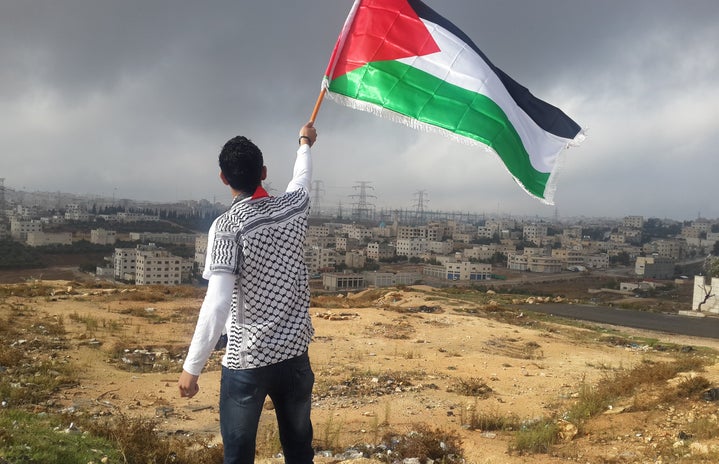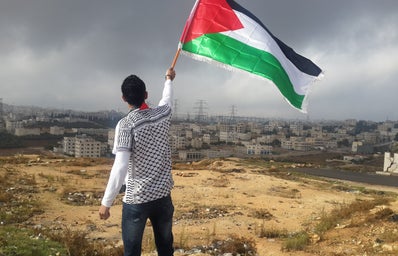The Ron DeSantis administration is actively trying to ban Pro-Palestinian groups such as Students for Justice in Palestine across Florida campuses. There is a temporary pause on the ban as there are concerns that this is a violation of free speech. As of Nov. 16, the American Civil Liberties Union (ACLU) and the University of Florida’s Students for Justice in Palestine are suing both university leaders and Governor Ron DeSantis for attempting to deactivate these groups. The ACLU has said, “The deactivation order is an attempt to stifle student groups’ pro-Palestine advocacy on campus at a time when the Palestine–Israel conflict is a matter of vital public discourse and concern.”
I spoke with two students involved in Students for a Democratic Society (FSUSDS), a student activist organization here at Florida State University regarding this topic. FSUSDS has openly vocalized its support for the Palestinian community as they have organized numerous marches within the past month.
Ravza Cayir, an FSU student, expressed the importance of Pro-Palestinian groups on campus and said, “It should not be controversial to, especially on a college campus, say that Palestinians deserve life, dignity, and freedom.” Cayir is a Muslim woman who wears a hijab and said her experience of being involved in SDS has been positive. “[FSUSDS] taught me so much within a couple of months: that my voice matters, that I can wear my hijab and still hold the same value as a human being, that I am not alone in feeling cheated by my university, and that city commission meetings exist!”
Cayir condemns FSU President Richard McCullough’s silence and said, “Before I got into FSU, the school would send me emails embellished in promises of diversity, inclusion, safety, cultural sensitivity, responsible stewardship… I feel cheated. None of those are reflected in its response to the genocide happening in Gaza. How can I feel respected and seen by my university’s President while he is completely ignoring a group of people who look like me? He is able to see Israeli lives as valuable, and something worth mentioning. What makes Palestinian lives less worthy of his empathy?”
Cayir feels used as a Muslim woman by FSU, as she feels like she is a minority quota they needed to reach the year she was admitted. “Now that I am speaking up against their tainted ideals, I am a threat. I am blacklisted. I am silenced.”
I had the privilege of also speaking to Jayci Qassis, a Palestinian student here at FSU. Qassis also feels similarly to Cavir and said, “Don’t claim our success later, don’t utilize us in your data, and don’t claim our victories as yours. You have to embrace us first.”
Qassis also voiced disappointment but was not surprised at the university’s silence, noting FSU’s history of anti-Palestinian discrimination. She informed me that the Department of Education is currently conducting a formal investigation regarding Ahmad Daraldik, the FSU Student Senate President elected in June 2020. During his presidency, fellow students discovered his childhood social media posts and initiated a removal effort due to his personal views opposing Israel’s oppression of Palestinians. FSU is responsible for silencing a student who grew up on the West Bank and used his platform to express his dissatisfaction with his childhood living conditions. Soon after, he became the target of campaign attacks and threats.
“As right-wing media piled on with racist attacks against me and my family, FSU singled me out and abandoned me as a student, making the harassment worse,” Daraldik said. “FSU has a responsibility to ensure that all students, including Palestinians, are free to speak about their lives and experiences.” I found this situation to be similar to what is currently happening to Pro-Palestinian groups across campuses. Universities cannot silence Palestinian students who have lived through experiences that many never have.
President McCullough sent an email in support of the Jewish community amidst the Oct. 7 attack but has not yet stated his support for the Palestinian community and has remained silent. However, Cayir is not the only one who feels as if McCullough’s silence speaks volumes. Qassis expressed that McCullough serves as a symbol of leadership and his silence is problematic: “I couldn’t care less about his personal views. But as a college campus that prides itself on diversity, McCullough makes me feel as if we are not worthy of being seen or acknowledged.” Qassis also expressed to me that she feels FSUSDS serves as the only entity on campus that safeguards Palestinian students.
During my interview with Qassis, she was extremely vulnerable and open, which I greatly appreciated. Amid everything going on in the world, Qassis’ professor was the only authoritative figure to recognize how this could be impacting her. Qassis was checked on by her professor, who provided her words of support in a time of need. As a community in grief, the least that FSU can do is acknowledge that this is having an impact on Palestinian students in the same manner that they do for Israeli students. It is also President McCullough’s responsibility to denounce hate speech in all its forms, which is only rising.
This silence is also reflected amongst some of our potential country leaders. DeSantis and a few other Republican candidates have said the government should focus on combating antisemitism and not Islamophobia in the GOP presidential debate. This rhetoric is extremely harmful because it diminishes Islamophobia which is very much real as hate continues to spread. Both antisemitism and Islamophobia can be condemned, as can other forms of hate speech. If you simply tackle one type of hate speech, you will sweep the other under the rug, which just ignores a very real problem.
Cayir and Qassis expressed the importance of knowledge and the harms of limiting free speech. “We are getting this education for a reason — to become more knowledgeable and conscientious beings,” Cayir said. “This process includes standing up for the communities that are being actively silenced.”
Qassis wants people to understand that when consuming information, they should consider what the material’s aim is and why it is offered in the context that it is. She encouraged personal thinking, to broaden one’s horizons in general, and push beyond the confinements of one’s current existence. She said to apply this thinking to all aspects of one’s life, not just to this current situation. As a Palestinian-American, Qassis looks to the Palestinian people for inspiration, relying on their faith and strength to never give up who they are at their core. If they can have faith, so can she.
Acknowledgements: Thank you to FSUSDS, Jayci Qassis, and Ravza Cayir.
Want to see more HCFSU? Be sure to like us on Facebook and follow us on Instagram, Twitter, TikTok, and Pinterest!


